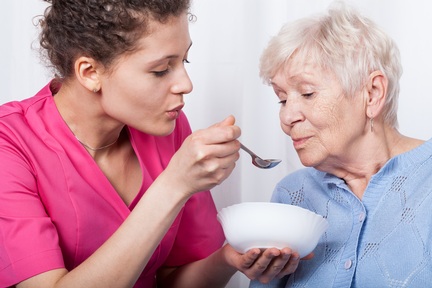Women will stay home to care for elderly, if care bosses can't recruit
More women will leave their jobs to care for elderly and sick relatives if social care employers can no longer recruit workers from the EU, the Department of Health has said - prompting Labour MP Jess Phillips to brand the prediction as "sexist" but true.

‘Greater numbers’ of women will take up informal care
If EU migrants are barred from coming to the UK post-Brexit, Ministers have said there will be a shortfall of 28,000 care staff within five years and women will most likely stop work to step in to support loved ones.
The Department of Health has warned: ‘If we fail to meet social care needs adequately we are likely to see a decrease in labour market participation levels, especially among women, as greater numbers undertake informal care.’
It also stated: ‘If social care employers were no longer able to recruit EEA [European Economic Area] direct care staff, after five years there could be some 28,000 fewer workers in the sector.'
This September, the Migration Advisory Committee (MAC) is scheduled to publish its guidance to the Government on the economic and social impacts of Brexit and on what the immigration system should look like post-Brexit.
But it is the Department’s statements made last November which have been hitting the headlines this week.
In its 37-page document: ‘Evidence on EEA nationals working within the health and care system, focusing on England’, the Department issued a warning as a written response to a call for evidence issued by MAC.
The Department's prediction has led Labour MP for Birmingham Yardley Jess Phillips to tweet on 6 August: ‘You might think this is sexist, and that men can and do care for older people and children too.
‘Of course they can, but still the vast majority is done by women. It's true that women will be worst affected by this’.

Staff from the EEA make up seven per cent of the adult social care workforce - 90,000 people. The majority are employed in low-paid care roles totalling 69,000 posts.
Some 16 per cent of registered nurses in social care are EEA nationals. Last October, the former health secretary Jeremy Hunt announced a 25 per cent increase in training posts for nurses. A further 5,000 nursing associates will be trained through the apprentice route in 2018, with an additional 7,500 trained in 2019.
However, the Department admits ‘there is a lag in the time it takes to train a new member of staff, especially for medics.’
Ministers also stated: ‘Migration will need to continue to play a vital role in meeting future demand and providing a means of ensuring flexible supply in response to changes in demand for health and care. It is vitally important that any approach to migration prioritises the health and care sector.’
To read the report ‘Evidence on EEA nationals working within the health and care system, focusing on England’ click here.
Latest News
 29-Jul-24
Dementia Bus gives carehome.co.uk staff insight into life with dementia
29-Jul-24
Dementia Bus gives carehome.co.uk staff insight into life with dementia
 01-Mar-24
Find out the top care homes in 2024
01-Mar-24
Find out the top care homes in 2024
 21-Mar-23
UK's top care homes in 2023 revealed
21-Mar-23
UK's top care homes in 2023 revealed
 03-Jan-23
carehome.co.uk launches free care helpline
03-Jan-23
carehome.co.uk launches free care helpline
 13-Dec-22
5 mins with Emily Whitehurst, chief operating officer for Constantia Healthcare
13-Dec-22
5 mins with Emily Whitehurst, chief operating officer for Constantia Healthcare